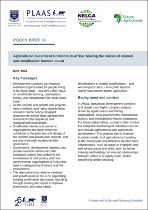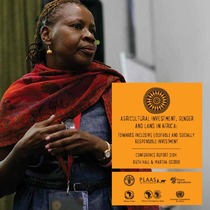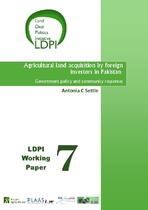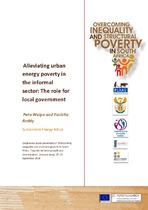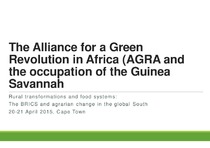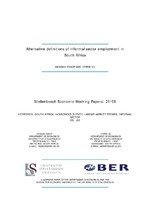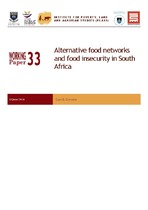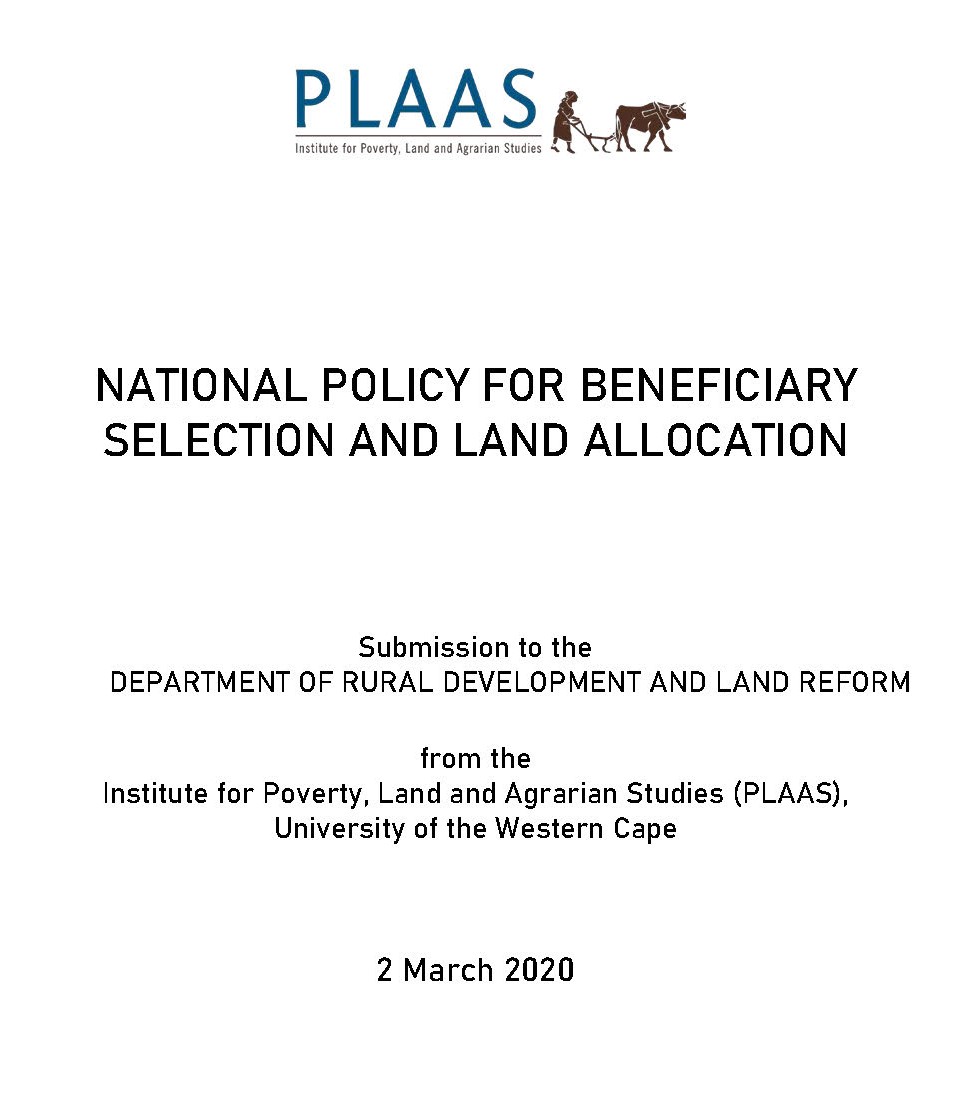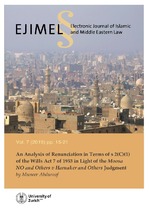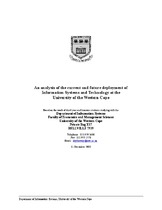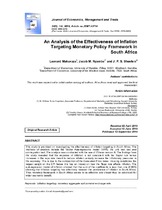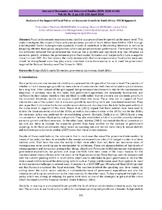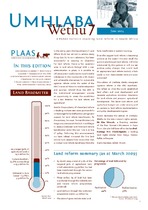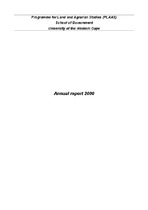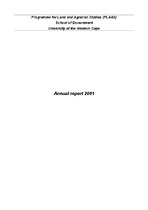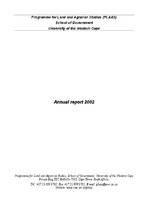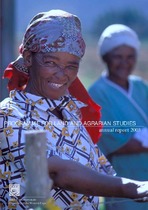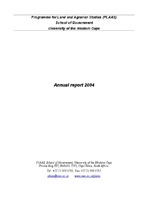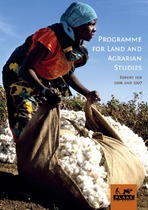Browsing Faculty of Economic and Management Sciences by Title
Now showing items 21-40 of 1094
-
Agricultural investment corridors in Africa: Making the voices of women and smallholder farmers count
(UWC PLAAS, 2023)Development corridors can improve livelihood opportunities for people living in far-flung areas – but only if they focus on smallholder farming, pastoralism, fishing, and infrastructure for small-scale trade. Land rights ... -
Agricultural investment, gender and land in Africa: Towards inclusive equitable and socially responsible investment
(Institute for Poverty Land and Agrarian Studies (PLAAS), 2014)The Food and Agriculture Organization (FAO) of the United Nations; the Institute for Poverty, Land and Agrarian Studies (PLAAS) at the University of the Western Cape, South Africa; the Future Agricultures Consortium (FAC); ... -
Agricultural land acquisition by foreign investors in Pakistan: Government policy and community responses
(Institute for Poverty, Land and Agrarian Studies, University of the Western Cape, 2012)This paper explores the Pakistani government’s 2009 agricultural investment policy package — a response to increasing foreign investor interest in agricultural land — and considers the likely implications for local communities. ... -
Agriculture, value chains and the rural non-farm economy in Malawi, South Africa and Zimbabwe
(Spinger Nature, 2019)This chapter compares rural development in Malawi, South Africa and Zimbabwe, concentrating on agricultural value chains and their implications for the rural non-farm economy (RNFE). Based on detailed qualitative exploration, ... -
Alleviating urban energy poverty in the informal sector: The role for local government
(Institute for Poverty Land and Agrarian Studies (PLAAS), 2010)The depth and severity of poverty and inequality persists in South Africa, despite progressive pro-poor policies. Strong evidence also points to the unbridled growth in informality and remaining as a long-term feature of ... -
The Alliance for a Green Revolution in Africa (AGRA and the occupation of the Guinea Savannah
(2015)The US, EU and African agricultural modernisation G8 New Alliance on Food Security and Nutrition (NAFSN), USAID and US foreign policy AGRA – Gate Foundation, Rockefeller Foundation – philanthro-capitalism Corporate ... -
Alternative definitions of informal sector employment in South Africa
(Stellenbosch University, 2008)Before the introduction of the Quarterly Labour Force Survey (QLFS) in 2008, Statistics South Africa (Stats SA) has been using the same methodology to derive the informal sector employment throughout the years, focusing ... -
Alternative food networks and food insecurity in South Africa
(Institute for Poverty, Land and Agrarian Studies, University of the Western Cape, 2016-06)Food security remains a persistent global challenge. Inequality means that food insecurity is disproportionately experienced. Despite positive shifts in the state of food security at a global scale, recent reports from ... -
Amendment submission: National policy for beneficiary selection and land allocation
(Institute for Poverty, Land and Agrarian Studies, 2020-03-02)PLAAS has read and considered the implications of the National Policy for Beneficiary Selection and Land Allocation and submits the following comments and recommendations to the Director-General: Rural Development and Land Reform. -
An Analysis of Renunciation in Terms of s 2(C)(1) of the Wills Act 7 of 1953 in Light of the Moosa NO and Others v Harnaker and Others Judgment
(Electronic Journal of Islamic and Middle Eastern Law (EJIMEL), 2019-05-29)Muslims have been living in South Africa for over 300 years. These persons are required in terms of their religion to fol-low Islamic law. There has (to date) been no legislation enacted by the South African parliament ... -
An analysis of the current and future deployment of Information Systems and Technology at the University of the Western Cape
(Dept of Information Systems, Univ. of the Western Cape, 2000)In order to successfully deploy information technology and information systems, any organisation must have a strategy indicating where its business is going, an understanding of the information systems that will help to ... -
An analysis of the effectiveness of inflation targeting monetary policy framework in South Africa
(Journal of Economics, Management and Trade, 2019)This study is premised on investigating the effectiveness of inflation targeting in South Africa. The methods of analysis include the Vector Autoregressive model (VAR), the unit root test and cointegration test. The ... -
Analysis of the Impact of Fiscal policy on economic growth in South Africa: VECM approach
(2018)Fiscal policy ensures macroeconomic stability as a precondition for growth at the macro level. This study investigates the impact of fiscal policy on economic growth of South Africa from 1960 to 2014 through a Cointegrated ... -
ANC election manifesto in relation to rural development and land reform
(PLAAS, 2009-06)In the last 15 years the Department of Land Affairs (DLA) has set out to achieve many things but, by its own admission, has been unsuccessful in meeting its objectives for land reform. Hence a few questions arise. Is land ... -
Annual report 2000
(Institute for Poverty Land and Agrarian Studies (PLAAS), 2001)The Programme for Land and Agrarian Studies (PLAAS) focuses on the land restitution and redistribution programmes initiated by the post-apartheid democratic state; land tenure reform; emerging regimes of natural resource ... -
Annual report 2001
(Institute for Poverty Land and Agrarian Studies (PLAAS), 2002)PLAAS continues to grow and to take on new projects and staff. This presents a number of challenges, not least of which is the sustainability of such growth. The year 2001 saw the completion of a twelve month-long ... -
Annual report 2002
(Institute for Poverty Land and Agrarian Studies (PLAAS), 2003)The year 2002 was an extremely busy one for PLAAS staff, and saw the initiation of many new projects and activities, some of them qualitatively different to anything undertaken before. These included an in-depth, national ... -
Annual report 2003
(Institute for Poverty Land and Agrarian Studies (PLAAS), 2004)Applied social science researchers generally want to see their research influence policy and practice; those of a more activist bent seek to ‘change the world, not simply to interpret it’.1 In its mission statement ... -
Annual report 2004
(Institute for Poverty Land and Agrarian Studies (PLAAS), 2005)The wider context of our research and training, and the ultimate rationale for establishing and maintaining a centre such as PLAAS, is the key challenge of deeply entrenched poverty, as well as the inequality to which ... -
Annual report 2006-2007
(Institute for Poverty Land and Agrarian Studies (PLAAS), 2008)Over the past two years the contradictions inherent in South Africa’s post-apartheid growth and development path have become increasingly evident. Growth has not managed to reduce very high levels of unemployment to a ...

